The following suicide prevention article is being republished with permission by staff writer Brenda Barbosa attributed to Charlotte Sun. All the Staff here at Charlotte Behavioral Health Care thank the Sun and Brenda for highlighting this important topic. We hope by doing so a dialog can be formed that makes talking about the subject of suicide less stigmatic. Thus, opening the way to reviving a positive forum of help that can lead to positive changes and save lives.
Please join us at Gilchrist Park, Punta Gorda at 7:00 p.m. September 10, 2014 for National Suicide Awareness Day (See: Suicide Awareness Candlelight Walk).
Join the Facebook Suicide Prevention Suicide Awareness Candlelight Walk event page.

Guns and Mental Illness
By BRENDA BARBOSA STAFF WRITER ~ Email: bbarbosa@sun-herald.com
There’s no doubt in 43-year old Chato B. Stewart’s mind that he’d be dead if he’d had access to a gun that dreadful night in 2004 when he planned to kill himself.
A powerful cocktail of medications prescribed to treat his depression threw the Port Charlotte man into a hallucinogenic spiral that ultimately landed him in a Sarasota crisis stabilization unit.
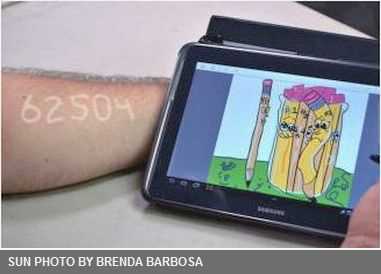
Using a hot knife, he branded the date of the event permanently on his forearm — his version of a suicide note.
“That quick mix of meds threw me into a psychotic break,” said Stewart, ….“That was the first time I heard voices that were telling me to hurt myself and my family.”
“About the Image: Blogger, cartoonist and mental health advocate Chato B. Stewart shares his struggles with depression and bi-polar disorder through his art. In June 2004, the 43-year-old Port Charlotte man attempted suicide. Here, you can see the date of his planned death which he brand with a hot knife on his left forearm. “I didn’t really want to die,” he said. “But I didn’t know how else to relieve the pain I was feeling inside.”
Luckily, Stewart did not have access to a gun.
Unfortunately, that’s not the case for most suicide victims in Charlotte County.
“A majority of our deaths are by firearm,” said Vicki D’Agostino, chair of the Charlotte County Community Health Improvement Partnership’s mental health subcommittee.
The partnership, better known as CHIP, was convened earlier this year by the Charlotte County Health Department to look at the rate of suicide in the county — which exceeds state and national rates
— and figure out what’s driving the death toll.
According to the Charlotte County Medical Examiner’s Office, an overwhelming majority of deaths in the county can be attributed to the use of firearms.
Local mental health professionals want to bring attention to the issue, hoping it will force policymakers and the public at large to understand the perilous intersection between mental illness and access to guns.
“It’s unbelievable, when you talk with people, how they are not connecting that firearm access is so dangerous for a person who, say, is significantly depressed,” D’Agostino said.
More importantly, people can be helped, but only if they are alive, D’Agostino said. It’s a myth that someone who is suicidal is determined to die, she said.
“We need to change our thought process that if someone wants to kill themselves, they’re going to do it anyway,” she said.
Unfortunately, state lawmakers are making it more difficult for mental health providers to screen for dangerous situations , experts said.
One piece of legislation they point to is the infamous Firearm Owners’ Privacy Act, better known as the “Docs vs. Glocks” law. Florida’s Republican controlled Legislature adopted the law after an Ocala couple complained that a doctor had asked them about guns. The couple said they refused to answer the question, and the physician refused to see them again. In 2011, Gov. Rick Scott signed the measure into law, essentially prohibiting doctors from asking patients about gun ownership or recording that information in medical records. The law later was deemed a constitutional violation of physicians’ freedom of speech.
Last month, however, a federal appeals court said the law legitimately regulates professional conduct and does not violate doctors’ First Amendment rights. By a 2-1 decision, the appeals court upheld the law as a protection of patient privacy rights, and said the limits imposed by it were “incidental.” Doctors who break the law could be fined and/or lose their licenses.
Mental health advocates and medical groups plan to challenge the ruling. For now, a judge’s injunction remains in place until any request for a rehearing before the appeals court is resolved.
It’s an emotional and politically charged issue that has pitted right-to-bear arms advocates against mental health providers, who say asking about guns is necessary to ensure a patient’s safety.
Local state Rep. Ken Roberson, R-Port Charlotte, who voted in favor of the law, said he doesn’t believe asking about guns “is necessary for good patient care.”
“The act simply codifies that good medical care doesn’t require inquiry or record-keeping of firearms,” Roberson said.
But Charlotte Behavioral Health Care’s lead psychiatrist Dr. Katina Matthews-Ferrari disagrees.
“It would inhibit doctors that are treating depressed and suicidal patients from asking questions that could be lifesaving,” she said.
Sadly, with firearms, the majority of cases are fatal.
Stewart considers himself among the lucky. Not only did he survive — doctors say he’s thriving. Stewart is using his experiences and struggles with mental illness to bring awareness to an issue that has long been plagued by stigma. As a blogger, cartoonist and mental health activist, today he uses art as a therapeutic way to cope with his illness and inspire others to seek treatment. Mental illness, he said, does not have to be a death sentence.
“I didn’t want to die; I just wanted relief from the pain I was feeling inside,” he said. “People need to know that this is an illness, and you can intervene up until the very last breath. But once it’s over, that’s it. It’s over. There’s nothing you can do.”
Below are a few of Chato Stewart’s Mental Health Humor cartoons dealing with Depression.
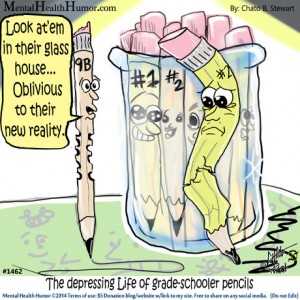
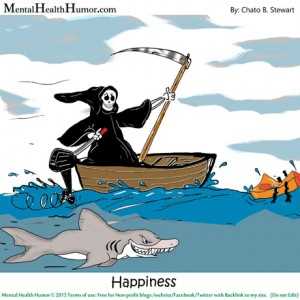
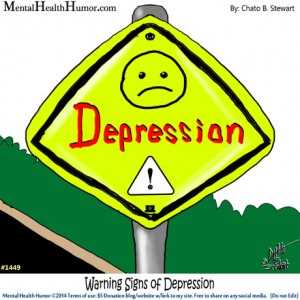
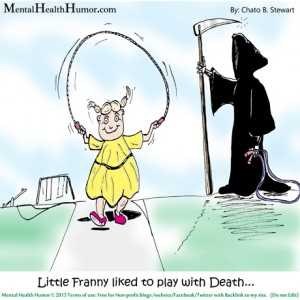
The post Suicide Prevention: You Can Intervene Up Until The Very Last Breath appeared first on Charlotte Behavioral.